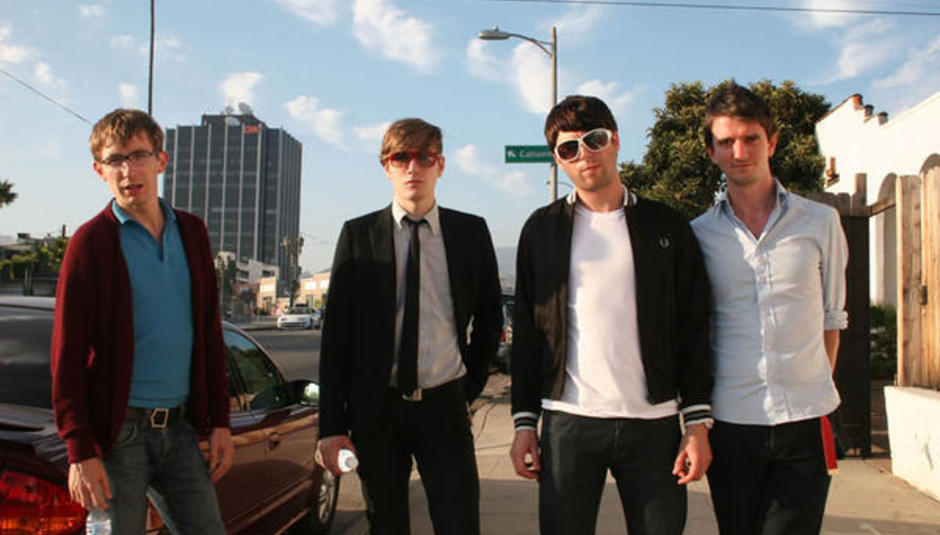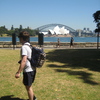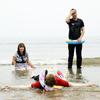It doesn’t seem like five minutes ago, let alone nearly five years, since The Rakes first unleashed their initial two-minute statement of intent '22 Grand Job' via tiny indie Trash Aesthetics. Although (wrongly) thrown together with the London "scene" bands of the time like The Others and Thee Unstrung, it was always quite apparent that The Rakes had the songwriting nous that many of their peers of the time lacked.
Fast forward to 2009, and the band are gearing up for the release of album number three, Klang. Recorded in Berlin last summer, Klang is the sound of a band returning to the more primitive sounds of their debut long player Capture/Release. Undoubtedly inspired by Bowie’s mid-1970s period, among other things, Klang is a healthy step forward from 2007’s ambitious but slightly disappointing Ten New Messages.
Currently on tour playing a series of low key dates that will serve as a warm-up for April’s "proper" tour schedule (in support of the album), DiS caught up with the five Rakes – Alan Donohoe (vocals), Matt Swinnerton (guitar), Jamie Hornsmith (bass), Lasse Petersen (drums), and newcomer to the fold Chris Ketley (guitar/keyboards) – post-soundcheck before their recent sold out show at The Royal in Derby.
DiS: Your new album bears quite a few similarities – both lyrically and in some parts of the music – to your first record. There’s certainly a harsher feel to it, wouldn’t you say?
AD: I’d actually say it’s much more harsh than Capture/Release to be honest. I think Paul’s (Epworth) production style on that record was very pre-programmed, very dance orientated in some ways, very controlled... LP: Of all three albums the first one was actually more produced than anything.
DiS: If you could change anything about the recording of Capture/Release would you?
AD: No, I don’t think I would. I don’t tend to listen to our records after we’ve finished them to be honest as I’d just spend hours nitpicking over the slightest thing. The only time I ever listen to any of our material is before we go on tour if I’ve forgotten the words to something! 'Open Book' is one that springs to mind at the minute. I forgot the words to that the other night so ended up singing a load of phrases in French, except I don’t really know much French...
Video: 'Strasbourg'
---
DiS: I think a lot of people will be surprised when they hear Klang, certainly those that may have gotten into the band around the time of Ten New Messages at any rate.
JH: I think a lot of the song structures have changed, certainly. We’ve changed as a band over that period of time, improved as songwriters too, and I think it shows through all of the songs on this record.
AD: I think the first record was more about attitude, of being in a certain place at a certain time. This one for me is more song-based, and I think we’ve been more assertive lyrically than on either of our previous two albums.
LP: It probably sounds quite cliched but Klang really is about the songs. We’ve been really careful with this record and how it sounds, and the sifting process as to what made the final cut was quite intense.
JH: With the last record we were touring pretty constantly while we wrote it, and although we managed to get together with some very professional producers in-between times to record those ten songs, it probably didn’t come out as well as we’d hoped. With this one though, we took a break from playing live and just concentrated on writing songs for a whole year.
LP: We had about thirty songs in total, and we’ve taken eleven of those for this record. The way we went about deciding which ones to use was to road test the whole lot in unfamiliar territories, so we played shows in all these places where we hadn’t been before – Russia, Australia, East Asia.
JH: Everywhere bar the UK I guess...
LP: What we didn’t want was a repeat of Ten New Messages, which to all intents and purposes was a studio album.
JH: It was crazy playing somewhere like Singapore where they’d never seen us before to a couple of thousand people...
MS: It was really weird because they had this radio show where they asked people to write an essay about the show, so we had all of these people writing pages of notes during the gig!
DiS: How did you go about deciding which songs would make the final cut, bearing in mind your audiences weren’t previously aware of the band?
LP: Of the thirty, some were actually combined and made into one song. A few of them will end up as b-sides on future singles too.
AD: I think that’s where we reversed the process to be honest. A lot of the time people end up watering the stuff down, but here we’d like to think we’ve built a lot of the songs up. We’ve also used a lot of different types of instrumentation that people wouldn’t previously associate with The Rakes. A lot of the music on Klang is piano-based. I guess it was our intention to return the piano away from the likes of Elton John back to its cockney roots!
JH: I think a lot of bands have fallen into that trap of thinking that better production makes a better album; there are so many records we’ve listened to recently that have all kinds of bells and whistles on them yet the songs themselves seem neglected.
AD: We want this record to be seen as being timeless, something people will come back to and re-visit rather than dismiss as a passing fad.
DiS: It’s quite interesting looking back now, as a lot of those bands who you were lumped in with around the time you first came to our attention are no longer around.
AD: Yeah, I mean we always set about doing our own thing regardless of any scene. It was certain elements of the music press who lumped us in with bands like The Others and The Paddingtons not us. We never wanted to create or be part of any scene. It wasn’t our intention and I think over time we’ve proved that.
DiS: I guess its even more ironic that initially your music was compared to Joy Division, which looking back now is not so obvious, when there seems to be a wave of bands around at the minute with ambitions to be mentioned in the same breath as them.
LP: I think a lot of that came from our live shows though. Joy Division were very intense, and Alan is very intense too. It's also fair to say that Joy Division are a band who we’re all quite fond of so I can kind of see why people would say that.
AD: I think one of the reasons why I came across that way in the early days was purely down to nerves. I wanted to get the songs over and done with as quickly as possible and in the instrumental breaks, it was more a case of “What do I do?” I mean, Matt had his guitar, Jamie had his bass, Lasse was busy on the drums so all I could do was bust out some moves! Personally I’m just waiting for a band to come along where someone from the music press says “they sound just like The Rakes”.
Video: 'We Danced Together'
---
DiS: Going back to the new record, some of the lyrics seem quite obtuse, 'Shackleton' being one that springs to mind in particular.
AD: 'Shackleton' is a song about endurance. I guess you could say that the lyrical flow of that song perhaps when you sit down and look at it doesn’t necessarily make an awful lot of sense, but it was our intention to create a song that was really disjointed, and more about the way the individual parts work than just a storyline as a whole. Musically, it's possibly the least repetitious thing we’ve ever done and rhythmically it moves in all kinds of different angles. I think that along with 'Muller’s Ratchet' [these] are possibly the two least-obvious, and definitely non-commercial songs we’ve ever written.
DiS: Was it a deliberate attempt on your part to write songs that perhaps wouldn’t be considered as radio friendly as most of your previous works?
AD: No not really. I mean, for every ‘Shackleton’ or ‘Muller’s Ratchet’ there are songs like ‘1989’ and ‘The Woes Of The Working Woman’ that are much more immediate and well-honed. I think we generally tend to write catchy songs with hooks in...there’s never really been a deliberate process either way to be honest.
LP: There was a lot more pressure on us from the record company to write radio-friendly songs for the last album, but this time we were left alone to our own devices, so maybe that’s why Klang in some ways can be seen as being an anti-commercial record...
DiS: Why do you think your label have put you under less pressure this time?
AD: I don’t know, but we feel much more liberated now than at any other time I can remember. To be fair to _V2_, they have been quite reasonable most of the time apart from certain points where their commercial expectations maybe went beyond ours.
DiS: Was there ever a point where you felt like calling it a day and returning to the world of 9-to-5 day jobs etc?
AD: I don’t think there’s ever been a time where we felt like giving up the band. We certainly got to a point where we all needed an extended break from each other, but I think we’re also too engrossed in what we do to ever contemplate a future without being in this band. Again, it probably sounds like a cliché but we get so much satisfaction out of being able to make music for a living that we’d probably struggle to revert back to doing anything else. There’s no other job in the world where you can have several thousand people pay to see you whilst telling you how good you are on a regular basis!
DiS: So have you decided what future singles will be following ‘1989’ off of Klang?
AD: No. We’d rather leave that down to the people at the record label to be honest. We just write the songs; they make the business decisions... LP:...which is not to say we don’t have any input in that part of the process. We do, its just that it isn’t something we consciously care about. I remember watching a documentary on MTV a while back with that Chad Kroeger bloke out of Nickelback just after their first single had gone platinum worldwide, and he was stressing about how he was struggling to write another song like that, analysing it word-for-word, piece-by-piece. I guess that’s the difference between a band like The Rakes who are in the music industry because we want to create something new every time and bands like Nickelback who are purely career obsessed.
DiS: Finally, if The Rakes could be an amalgam of different artists either past or present who would it be?
AD: The bisexuality of David Bowie.
MS: The cult status of The Stooges.
LP: The fun of De La Soul.
AD: The personal hygiene of Dominic Masters!
The Rakes play the following dates in April:
21 Brighton Concorde 2
22 Portsmouth Wedgewood Rooms
23 Manchester Club Academy
24 Dublin The Button Factory
25 Glasgow Oran Mor
26 Newcastle The Cluny
28 Nottingham Rescue Rooms
29 London Koko






















